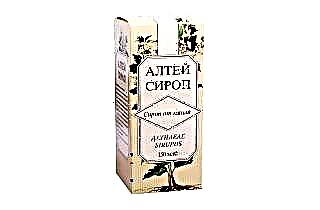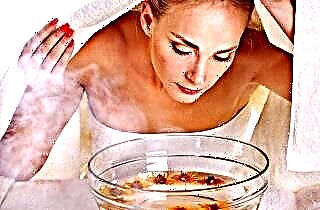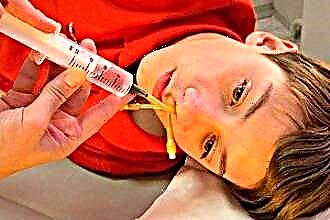Treatment for cough while breastfeeding should be prompt. Airway spasm is always a symptom, not a separate disease. To select the most effective therapy, you need to find out what exactly caused the violation, and direct all efforts to eliminate the disease. Prompt measures are necessary not only to preserve the health of the woman, but also to prevent infection of the baby. However, not all drugs can be used, since most of them can negatively affect the well-being of the child.
Determine the nature of the disease
 Breastfeeding coughing can occur for a variety of reasons. Some women face chronic diseases that lead to bronchospasm (bronchial asthma, obstructive bronchitis). Also, a cough can be caused by diseases of the gastrointestinal tract or the cardiovascular system, in such cases, methods of its elimination are selected after passing a detailed examination. However, most often this symptom is caused by such ailments:
Breastfeeding coughing can occur for a variety of reasons. Some women face chronic diseases that lead to bronchospasm (bronchial asthma, obstructive bronchitis). Also, a cough can be caused by diseases of the gastrointestinal tract or the cardiovascular system, in such cases, methods of its elimination are selected after passing a detailed examination. However, most often this symptom is caused by such ailments:
- bacterial respiratory tract infections;
- viral infections;
- allergic reactions.
Sometimes the diseases are of a mixed nature: a fungal infection can join the bacterial infection. In this case, not only bronchospasm is observed, but also a sore throat.
How to treat a cough of this nature is decided by the attending physician. Complex therapy should be effective enough and at the same time safe for the baby's health. Consider how to deal with different types of bronchospasm.
Treating a bacterial infection
 If the respiratory tract is caused by bacteria, a nursing mother's cough can be treated with safe antibiotics. The most popular and harmless to the health of the newborn is the drug "Amoxiclav". It actively fights against pathogenic microorganisms and strengthens the immune system. Also, the doctor may prescribe Furacilin tablets. They are intended for gargling, destroying both bacteria and fungi.
If the respiratory tract is caused by bacteria, a nursing mother's cough can be treated with safe antibiotics. The most popular and harmless to the health of the newborn is the drug "Amoxiclav". It actively fights against pathogenic microorganisms and strengthens the immune system. Also, the doctor may prescribe Furacilin tablets. They are intended for gargling, destroying both bacteria and fungi.
Hexoral will help a nursing mother to successfully treat a cough. The drug is available in the form of tablets and spray. It is effective for fungal infections of the respiratory tract, it will be useful for angina, tonsillitis, etc.
The above means do not require weaning the baby from the breast, feeding is carried out as usual. If the doctor prescribes stronger medications, then you need to express milk during the entire treatment, and after the drug is discontinued, continue breastfeeding.
Elimination of viral diseases
 Banal ARVI, flu and colds can cause a lot of inconvenience to a young mother. To get rid of bronchospasm in such diseases as quickly as possible, you need to choose the right drugs. Some of them will be helpful for dry coughs, while others will make it easier for phlegm to pass out when wet. Let's consider the medicines approved for use in more detail.
Banal ARVI, flu and colds can cause a lot of inconvenience to a young mother. To get rid of bronchospasm in such diseases as quickly as possible, you need to choose the right drugs. Some of them will be helpful for dry coughs, while others will make it easier for phlegm to pass out when wet. Let's consider the medicines approved for use in more detail.
- "Herbion". The syrup helps treat both wet and dry coughs. With hv it is completely safe, since it consists of natural ingredients - plantain juice and thyme extract. Taking the drug is prohibited in case of personal intolerance to the components, diabetes mellitus and asthma.
- "Prospan". The syrup is effective for dry cough: it has an expectorant effect, dilutes phlegm and increases it in volume. The preparation is based on ivy extract, which can be hazardous to health only in case of personal intolerance.
- "Lizobakt". Available in pill form. The drug is a combined action, prescribed for influenza, stomatitis and tonsillitis. Does not have a negative effect on the body of a nursing mother and baby, but only if there is no allergy.
 Bioparox. A spray that helps relieve coughs, sore throat and runny nose. It has a complex effect: it simultaneously disinfects mucous membranes, fights against pathogens, relieves pain and heals microdamages.
Bioparox. A spray that helps relieve coughs, sore throat and runny nose. It has a complex effect: it simultaneously disinfects mucous membranes, fights against pathogens, relieves pain and heals microdamages.- Althea syrup. A natural expectorant that helps treat a nursing mother's cough without harming the baby. It has a vegetable base, but, given the high biological activity of the marshmallow root, it can cause allergies.
Getting rid of allergic bronchospasm
If the mother is coughing from allergies, antihistamines can help. Most often, with such a violation, "Fenistil", "Cetirizin", "Erius", "Loredin", "Alsedin" are prescribed. Such popular drugs as "Diazolin" and "Suprastin" should not be taken, since their active substances can penetrate into breast milk and adversely affect the health of the child.
To avoid a negative reaction from the mother's body, you need to try to prevent contact with allergens. If this has already happened, sorbents should be taken. The safest will be "Smecta" and the familiar to all "Activated Carbon".
However, it is worth remembering that the dosage should be less than usual. If you are taking regular black charcoal, the amount should not exceed 10 tablets per day.
Stop feeding or not?
 If the mother does not have problems with lactation, doctors strongly advise against weaning the baby during treatment. An exception is the use of potent antibiotics; in all other cases, the baby should receive breast milk in full, since it contains substances necessary to form immunity and protect against infections. On the second day of the disease, interferon begins to be produced in the woman's body, which is transmitted to the baby, and on the fifth day - antibodies that help to resist viral diseases. However, it is worth following these rules during treatment:
If the mother does not have problems with lactation, doctors strongly advise against weaning the baby during treatment. An exception is the use of potent antibiotics; in all other cases, the baby should receive breast milk in full, since it contains substances necessary to form immunity and protect against infections. On the second day of the disease, interferon begins to be produced in the woman's body, which is transmitted to the baby, and on the fifth day - antibodies that help to resist viral diseases. However, it is worth following these rules during treatment:
- If the disease is viral or bacterial, wear a mask when handling or feeding your baby.
- Wash your hands with antibacterial soap as often as possible to avoid infecting your baby.
- Take the medications prescribed by your doctor immediately after feeding, so the amount in breast milk will be as low as possible for the next feeding.
- Ventilate your baby's room often to avoid infection.
Inhalation for nursing mothers
To cure a cough as quickly as possible, inhalations with herbs and special medications can be done. They have a targeted effect on the respiratory tract, relieve bronchospasm, facilitate sputum discharge and protect mucous membranes. The funds have a local effect, are not absorbed into the bloodstream, and therefore do not pass into breast milk.
For procedures, you can use the following solutions:
 Alkaline. Prepared with soda dissolved in water or saline, you can also use the alkaline mineral water "Essentuki-7", "Borjomi". These funds have a beneficial effect on mucous membranes, disinfect them and relieve swelling, promote the production of sputum and its soft separation.
Alkaline. Prepared with soda dissolved in water or saline, you can also use the alkaline mineral water "Essentuki-7", "Borjomi". These funds have a beneficial effect on mucous membranes, disinfect them and relieve swelling, promote the production of sputum and its soft separation.- Antiseptics. Ready-made solutions of "Dekasan" and "Meramistin" will become a real salvation from viral infections. The drugs act exclusively on mucous membranes, without penetrating into other body systems, kill pathogenic microflora and prevent its reproduction.
- Mucolytics. Sputum diluents must be inhaled through the nose, not through the mouth. You can find ready-made preparations for inhalation in the pharmacy, the most popular of them are Lazolvan and Ambrobene. Medicines are used alone or mixed with saline in equal parts.
Inhalation can be used when the coughing patient does not feel relief. For the procedures, you will need a nebulizer or a special inhaler; you can buy them at the pharmacy.
The number of approaches in one day depends on the chosen drug, in general it is allowed to breathe healing vapors up to 3 times a day. If you decide to use decoctions or herbal infusions, then you can do inhalations up to 6 times a day.
Traditional methods
 To eliminate cough, a nursing mother can use folk remedies in addition to drug therapy. They must be discussed with the doctor, as they can be dangerous to the health of the baby and the woman. Consider the most popular methods for eliminating bronchospasm.
To eliminate cough, a nursing mother can use folk remedies in addition to drug therapy. They must be discussed with the doctor, as they can be dangerous to the health of the baby and the woman. Consider the most popular methods for eliminating bronchospasm.
- Rinsing. Gargling is allowed up to 10-12 times a day. To prepare the solution, use sea salt, iodine, baking soda, extracts of chamomile, calendula, sage. If you have chosen herbal remedies, to prepare a rinse, you need to pour 2 tablespoons of dry raw materials with boiling water and leave for 15 minutes. For one procedure, you need 1 glass of healing liquid.
- Rubbing. You can use pharmaceutical products, for example, "Doctor Mom", or natural honey. Remember that during lactation, no ointment should be applied to the breast area, they should only be applied to the neck, upper chest, back and soles of the feet. Perform the procedure before bedtime to improve the effect.
- Reception of warm drinks. Drinking warm water loosens phlegm and helps to remove it from the body. As a medicine, you can use tea from raspberry shoots or jam, warm milk with honey and butter, medicinal decoctions and infusions.
Caution comes first
 Nursing mothers should be especially vigilant when treating cough with folk remedies. Even natural ingredients can cause a negative reaction in a child, especially with regard to food allergens. These include bee honey and milk, the most popular cough remedies. To find out if medications are dangerous for the baby, start taking them with the minimum dose, gradually increasing it, if everything is in order with the child.
Nursing mothers should be especially vigilant when treating cough with folk remedies. Even natural ingredients can cause a negative reaction in a child, especially with regard to food allergens. These include bee honey and milk, the most popular cough remedies. To find out if medications are dangerous for the baby, start taking them with the minimum dose, gradually increasing it, if everything is in order with the child.
Medication can also have a negative effect on the baby's body. It is very important to observe the exact dosage of the funds, follow all the doctor's recommendations and not continue the course of treatment of your own free will.
If after 7 days of therapy there are no results, you need to go to a specialist again and select a new scheme for eliminating the disease.
Let's summarize
Nursing mothers can cope with coughs of different origins without harming the baby's health. Traditional and traditional medicine offers remedies to eliminate any type of bronchospasm. However, it should be borne in mind that the use of all drugs must be agreed with the doctor. Trust your health and the health of your child only to professionals, do not self-medicate.

 Bioparox. A spray that helps relieve coughs, sore throat and runny nose. It has a complex effect: it simultaneously disinfects mucous membranes, fights against pathogens, relieves pain and heals microdamages.
Bioparox. A spray that helps relieve coughs, sore throat and runny nose. It has a complex effect: it simultaneously disinfects mucous membranes, fights against pathogens, relieves pain and heals microdamages. Alkaline. Prepared with soda dissolved in water or saline, you can also use the alkaline mineral water "Essentuki-7", "Borjomi". These funds have a beneficial effect on mucous membranes, disinfect them and relieve swelling, promote the production of sputum and its soft separation.
Alkaline. Prepared with soda dissolved in water or saline, you can also use the alkaline mineral water "Essentuki-7", "Borjomi". These funds have a beneficial effect on mucous membranes, disinfect them and relieve swelling, promote the production of sputum and its soft separation.

